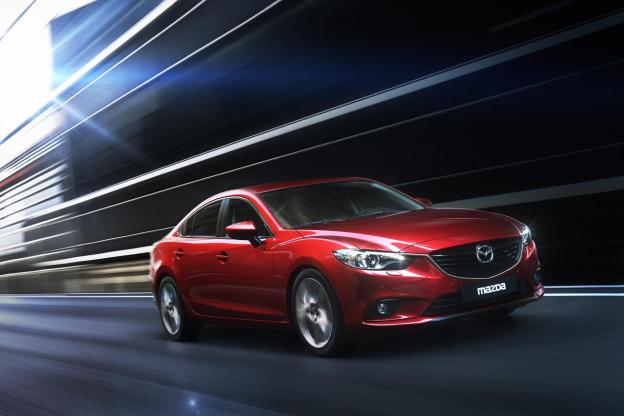 Mazda likes to talk about defying convention, and that strategy seems to be working. The 2014 Mazda6 midsize sedan just received an EPA rating of 40 mpg highway, thanks to its unusual i-ELoop regenerative braking system and energy storage system.
Mazda likes to talk about defying convention, and that strategy seems to be working. The 2014 Mazda6 midsize sedan just received an EPA rating of 40 mpg highway, thanks to its unusual i-ELoop regenerative braking system and energy storage system.
While 40 mpg has been the magic number for compact cars like the Ford Focus and Hyundai Elantra, it’s a major achievement for a midsize vehicle that doesn’t employ extra tech like turbochargers and electric motors.
i-ELoop is teamed with a 185 horsepower 2.5-liter four-cylinder engine and six-speed automatic or manual transmission in the Mazda6. The city and combined numbers for the automatic 6 are 28 and 32 mpg, respectively.
So what is i-Eloop? Short for “Intelligent Energy Loop,” it’s a piece of tech normally found on hybrids. i-ELoop uses large capacitors, rather than a dedicated electric powertrain, to capture energy during braking and coasting. This electricity is then used to power the car’s electrical accessories, meaning the gasoline engine spends less time driving the alternator, which eats up power that can be used to move the car.
Mazda says turning the electrical system over to i-Eloop frees up five to 10 percent of the engine’s power. It also says its capacitors can charge and discharge more quickly than batteries.
Capacitors have been around for decades and are used in all of types of electronic equipment. Most of us use them daily and never really know it. One of the most common places we use capacitors is in stereo equipment. The stereo stores up power in capacitors and when your favorite tune or movie needs power for bass response or higher volume, the energy stored in the capacitors is released to meet the demand.
i-ELoop is available on the top Grand Touring model ($29,695), grouped with the $2,080 GT Technology Package, which includes radar-guided cruise control, Forward Obstruction Warning, Lande Departure Warning, and smart high beams.
The 6’s 40 mpg highway number bests the top-selling 2.5-liter Toyota Camry (35 mpg) and 2.4-liter Honda Accord (36 mpg), as well as the midlevel Ford Fusion (36 mpg) equipped with the 1.6-liter EcoBoost four-cylinder.


